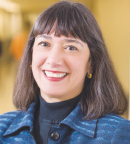A large randomized trial has found that frail and elderly patients with advanced gastroesophageal cancer may be safely and successfully treated with dose-reduced chemotherapy. In the GO2 phase III trial, low doses of oxaliplatin/capecitabine performed similarly to intermediate and high doses of the regimen, with improved quality of life.1 These results were presented in advance of the 2019 ASCO Annual Meeting in an online press briefing for journalists. Final data are being presented June 2.

The lowest [chemotherapy] dose tested was noninferior in terms of progression-free survival and produced less toxicity as well as better overall treatment utility.— Peter S. Hall, MD
Tweet this quote
“Previous trials of palliative chemotherapy for gastric and esophageal cancers have not included frail or older patients,” stated lead author Peter S. Hall, MD, a medical oncologist at the University of Edinburgh, United Kingdom. “This is the largest randomized controlled trial to date specifically investigating frail and/or elderly patients with advanced gastroesophageal cancer, and these results should guide future treatment. The lowest dose tested was noninferior in terms of progression-free survival and produced less toxicity as well as better overall treatment utility. We hope our findings help patients make an informed choice between low-dose chemotherapy and no chemotherapy at all, with the knowledge that low-dose chemotherapy may prove beneficial and still allow them to maintain some quality of life while slowing the progression of the disease.”
The median progression-free survival was 4.9 months with the highest dose of oxaliplatin/capecitabine, 4.1 months with intermediate doses, and 4.3 months with the lowest dose. Using the Overall Treatment Utility (OTU) tool, which incorporates traditional measures of treatment response, tolerability, and quality of life, the lowest dose regimen was the numerical winner. At week 9, good overall utility was reported in 35% of patients treated at the highest dose of oxaliplatin/capecitabine, 36% of those treated with the intermediate dose, and 43% of those treated at the lowest dose. Poor overall utility was reported in 31%, 38%, and 29%, respectively.
In addition, using the lowest dose of oxaliplatin/capecitabine did not shorten overall survival. The median overall survival was 7.5 months with the highest dose, 6.7 months with the intermediate dose, and 7.6 months with the lowest dose.
Study Rationale
Patients with advanced gastroesophageal cancer are often frail due to comorbidities and malnourishment, and these diseases are common in the elderly, with the average age at diagnosis of 75 years. Comorbidity and age-related changes in drug distribution can lead to increased toxicity with doses of chemotherapy used in younger patients.
“Since these patients are typically excluded from randomized clinical trials, we need evidence to inform the best treatment choices in frail and elderly patients,” Dr. Hall said.
Comment From ASCO President
“Oncologists struggle with a lack of data on elderly and frail patients, who represent about 60% of the patients we treat,”

Monica M. Bertagnolli, MD, FACS, FASCO
commented ASCO President Monica M. Bertagnolli, MD, FACS, FASCO, at the press briefing. “Only 10% are included in clinical trials. It is wonderful to have real data that will help guide their treatment.”
“‘Less is more’ is becoming a common refrain in some areas of cancer treatment, and one that is paying off for patients’ quality of life,” she continued. “This trial seeks to balance quality of life and increased survival for older and frail people receiving palliative treatment for gastroesophageal cancer. These data are important because they provide a potential new option for patients to slow the progression of disease.”
GO2 Trial Details
There is no standard of care for the treatment of advanced gastroesophageal cancer in the United Kingdom, and practices vary widely as to which regimen is used. Dr. Hall and colleagues previously compared two regimens commonly used to treat advanced gastroesophageal cancer in a feasibility study, with 313 frail and elderly patients enrolled. Oxaliplatin/capecitabine was deemed the “winner,” demonstrating superiority to a three-drug regimen of epirubicin/oxaliplatin/capecitabine.2
The GO2 study was designed to identify the optimal dose of oxaliplatin/capecitabine in older and/or frail patients and incorporate the OTU assessment tool to make that determination. The study randomly assigned 514 frail or elderly patients with advanced gastroesophageal cancer who were unfit for full-dose chemotherapy in a 1:1:1 ratio to one of three dose levels: level A (oxaliplatin at 130 mg/m2 given on day 1 every 21 days and capecitabine at 625 mg/m2 given twice daily on days 1 to 21; level B was 80% of level A doses; level C was 60% of level A doses. The criteria for study entry included a glomerular filtration rate at or above 30 mL/min per 1.73 m2 and a bilirubin level of less than 2 times the upper limit of normal. Patients with decreased kidney function received 75% of the allocated doses of capecitabine.
After 9 weeks, patients were scored for overall treatment utility. Treatment continuation thereafter depended on the clinician’s judgment.
Grade 3 or higher side effects were reported in 56% of patients treated at level A and B doses and in 37% of patients treated at the lowest doses.
‘New Paradigm’ for Assessing Outcomes?
“The OTU tool could represent a new paradigm for how to assess outcomes in older patients with late-stage disease,” Dr. Hall noted.
Dr. Hall and colleagues are planning further analysis of their findings. One of their objectives is to determine whether any of the factors that comprise the OTU tool is dominant in reflecting a patient’s health. The OTU tool currently takes into account whether the cancer is progressing on scans, oncologists’ assessment of benefits, lack of severe toxicity events, patients’ quality-of-life scores not deteriorating, patients scoring the treatment as worthwhile, and noninterference with activities.
The GO2 study was funded by Cancer Research UK. ■
DISCLOSURE: Dr. Hall has received institutional research funding from Novartis, Pfizer, Roche, AstraZeneca, and Daiichi Sankyo. For Dr. Bertagnolli’s disclosure information, visit coi.asco.org.
REFERENCES
1. Hall PS, Swinson D, Waters JS, et al: Optimizing chemotherapy for frail and elderly patients with advanced gastroesophageal cancer: The GO2 phase III trial. 2019 ASCO Annual Meeting. Abstract 4006. To be presented June 2, 2019.
2. Hall PS, Lord SR, Collinson H, et al: A randomised phase II trial and feasibility study of palliative chemotherapy in frail or elderly patients with advanced gastroesophageal cancer (321GO). Br J Cancer 116:472-478, 2017.


